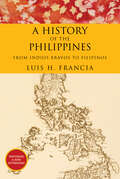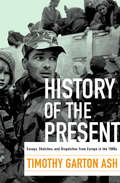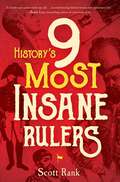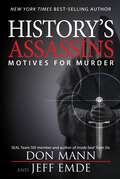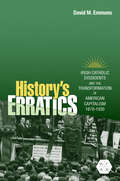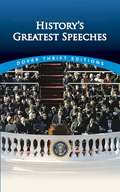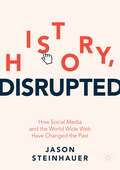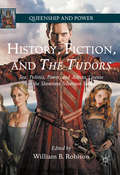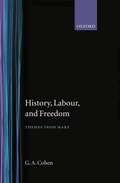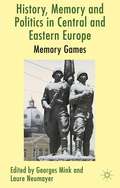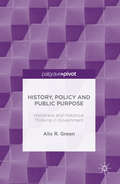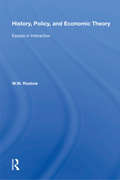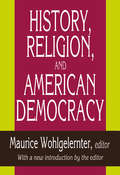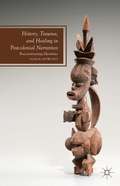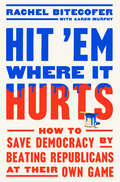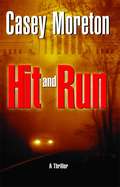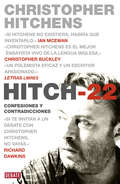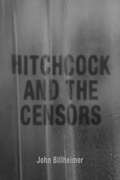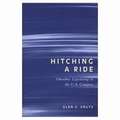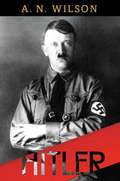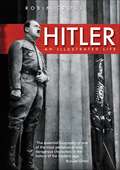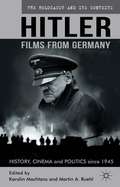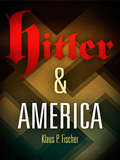- Table View
- List View
History of the Labor Movement in the United States, Vol. II: From the Founding of the American Federation of Labor to the Emergence of American Imperialism
by Philip S. FonerThis work includes information about: '80s Socialist movement and Labor, the Knights of Labor, Haymarket and May Day, Labor political action, the rise of the AFL, the Homestead strike, Coal creek and Cour d'Alene, American Railway Union, Pullman strike, Labor populism, Labor and the Spanish-American War, Labor and imperialism, and more.
History of the Labor Movement in the United States, Vol. III: The Policies and Practices of the American Federation of Labor, 1900-1909
by Philip S. FonerLabor at the turn of the Century; Open-shop drive; National Civic Federation; The church and labor; business unionism; Craft vs industrial unions; Women, Black and immigrant workers; AFL political policies; the Socialists; Western Federation of Miners; the American Labor Union, more.
History of the Philippines: From Indios Bravos to Filipinos
by Luis H. FranciaThe story of this nation of over seven thousand islands, from ancient Malay settlements to Spanish colonization, the American occupation, and beyond. A History of the Philippines recasts various Philippine narratives with an eye for the layers of colonial and post-colonial history that have created this diverse and fascinating population. It begins with the pre-Westernized Philippines in the sixteenth century and continues through the 1899 Philippine-American War and the nation's relationship with the United States&’ controlling presence, culminating with its independence in 1946 and two ongoing insurgencies, one Islamic and one Communist. Award-winning author Luis H. Francia creates an illuminating portrait that offers valuable insights into the heart and soul of the modern Filipino, laying bare the multicultural, multiracial society of contemporary times.
History of the Present: Essays, Sketches, and Dispatches from Europe in the 1990s
by Timothy Garton AshThe 1990s. An extraordinary decade in Europe. At its beginning, the old order collapsed along with the Berlin Wall. Everything seemed possible. Everyone hailed a brave new Europe. But no one knew what this new Europe would look like. Now we know. Most of Western Europe has launched into the unprecedented gamble of monetary union, though Britain stands aside. Germany, peacefully united, with its capital in Berlin, is again the most powerful country in Europe. The Central Europeans--Poles, Czechs, Hungarians--have made successful transitions from communism to capitalism and have joined NATO. But farther east and south, in the territories of the former Soviet Union and the former Yugoslavia, the continent has descended into a bloody swamp of poverty, corruption, criminality, war, and bestial atrocities such as we never thought would be seen again in Europe. Timothy Garton Ash chronicles this formative decade through a glittering collection of essays, sketches, and dispatches written as history was being made. He joins the East Germans for their decisive vote for unification and visits their former leader in prison. He accompanies the Poles on their roller-coaster ride from dictatorship to democracy. He uncovers the motives for monetary union in Paris and Bonn. He walks in mass demonstrations in Belgrade and travels through the killing fields of Kosovo. Occasionally, he even becomes an actor in a drama he describes: debating Germany with Margaret Thatcher or the role of the intellectual with Václav Havel in Prague. Ranging from Vienna to Saint Petersburg, from Britain to Ruthenia, Garton Ash reflects on how "the single great conflict" of the cold war has been replaced by many smaller ones. And he asks what part the United States still has to play. Sometimes he takes an eagle's-eye view, considering the present attempt to unite Europe against the background of a thousand years of such efforts. But often he swoops to seize one telling human story: that of a wiry old farmer in Croatia, a newspaper editor in Warsaw, or a bitter, beautiful survivor from Sarajevo. His eye is sharp and ironic but always compassionate. History of the Present continues the work that Garton Ash began with his trilogy of books about Central Europe in the 1980s, combining the crafts of journalism and history. In his Introduction, he argues that we should not wait until the archives are opened before starting to write the history of our own times. Then he shows how it can be done.
History's 9 Most Insane Rulers
by Scott RankFew mixtures are as toxic as absolute power and insanity. When nothing stands between a leader's delusional whims and seeing them carried out, all sorts of bizarre outcomes are possible. This book will look at the lives of the nine most mentally unbalanced figures in history. Some suffered from genetic disorders that led to schizophrenia, such as French King Charles VI, who thought he was made of glass. Others believed themselves to be God&’s representatives on earth and wrote religious writings that they guaranteed to the reader would get them into heaven, even if these leaders were barely literate. Whether it is Ottoman Sultan Ibrahim I practicing archery on palace servants or Turkmenistan president-for-life Akhbar Turkmenbashi renaming the days of the week after himself and constructing an 80-foot-tall golden statue that revolves to face the sun, crazed leaders have plagued society for millenia. While such stories are amusing, this book also contemplates the addictive nature of power and the effects it has on those who cling to it for too long. It explores how leaders can undertake the extraordinarily complicated job of leading a country without their full mental faculties and sometimes manage to be moderately successful. It examines why society tolerates their actions for so long and even attempts to put a facade of normalcy on rulers, despite everyone knowing that they are mentally unstable. The book also explores if insane rulers are a relic of the age of monarchs and will die out in the age of democracy, or if they will continue to plague nations in the twenty-first century. Finally, as many armchair psychologists question the mental health of Donald Trump and other populist politicians in the United States and Europe, all but diagnosing them with mental illness, this book sets to show that truly insane rulers are categorically different in the ways they endanger their population.
History's Assassins: Motives for Murder
by Don MannA fact-based book that highlights political assassins in history. The book includes the stories of the assassins rather than just their famous victims. The book dissects selected political assassinations and and why the assassins acted; detail stheir political goals, addresses why they chose the methods they chose, and describes the ultimate outcome of the assassination. In many cases, the assassinations were not effective and actually worked against the stated goals of the assassins. People of questionable sanity and cases where the act was strictly personal are not included. For the more modern subjects, there is supporting documentation with detailed accounts written at the time in question. However, with some of the historic cases, specifics on methodology, coconspirators, etc. are not well known or there are conflicting accounts. In such cases, reasoned dramatizations tare used o ensure the stories are entertaining to the reader as well as educational.The book is organized chronologically with examples from Ancient Persia and Rome and ending with several of the 19th and 20th Centuries&’ high profile assassinations. The assassins and the victims are representative of men and women, and eastern and western civilizations.
History's Erratics: Irish Catholic Dissidents and the Transformation of American Capitalism, 1870-1930 (Working Class in American History)
by David M. EmmonsAs Ice Age glaciers left behind erratics, so the external forces of history tumbled the Irish into America. Existing both out of time and out of space, a diverse range of these Roman-Catholic immigrants saw their new country in a much different way than did the Protestants who settled and claimed it. These erratics chose backward looking tradition and independence over assimilation and embraced a quintessentially Irish form of subversiveness that arose from their culture, faith, and working-class outlook. David M. Emmons draws on decades of research and thought to plumb the mismatch of values between Protestant Americans hostile to Roman Catholicism and the Catholic Irish strangers among them. Joining ethnicity and faith to social class, Emmons explores the unique form of dissidence that arose when Catholic Irish workers and their sympathizers rejected the beliefs and symbols of American capitalism. A vibrant and original tour de force, History’s Erratics explores the ancestral roots of Irish nonconformity and defiance in America.
History's Greatest Speeches (Dover Thrift Editions)
by James DaleyIdeal for classroom use, this anthology also provides a valuable tool for preparing or performing public speeches. Twenty of the world's most influential and stirring public lectures include Martin Luther King's "I Have a Dream" speech, Lincoln's Gettysburg Address, and Patrick Henry's "Give Me Liberty or Give Me Death!" oration.Additional speeches include Pericles' fifth-century BC funeral oration, George Washington's 1784 resignation speech, Martin Luther's 1520 address to the Diet of Worms, and Jonathan Edwards' 1741 sermon, "Sinners in the Hands of an Angry God." Other orations include Sojourner Truth's 1851 "Ain't I a Woman?" address, Frederick Douglass's 1852 "What to the Slave is the Fourth of July?" speech, Elie Wiesel's 1999 lecture on the perils of indifference, plus speeches by Eleanor Roosevelt, Winston Churchill, Mahatma Gandhi, Nelson Mandela, and other luminaries. Includes 3 selections from the Common Core State Standards Initiative: "I Have a Dream," "Gettysburg Address," and "What to the Slave is the Fourth of July?"
History, Disrupted: How Social Media and the World Wide Web Have Changed the Past
by Jason SteinhauerThe Internet has changed the past. Social media, Wikipedia, mobile networks, and the viral and visual nature of the Web have inundated the public sphere with historical information and misinformation, changing what we know about our history and History as a discipline. This is the first book to chronicle how and why it matters. Why does History matter at all? What role do history and the past play in our democracy? Our economy? Our understanding of ourselves? How do questions of history intersect with today’s most pressing debates about technology; the role of the media; journalism; tribalism; education; identity politics; the future of government, civilization, and the planet? At the start of a new decade, in the midst of growing political division around the world, this information is critical to an engaged citizenry. As we collectively grapple with the effects of technology and its capacity to destabilize our societies, scholars, educators and the general public should be aware of how the Web and social media shape what we know about ourselves - and crucially, about our past.
History, Fiction, and The Tudors: Sex, Politics, Power, and Artistic License in the Showtime Television Series (Queenship and Power)
by William B. RobisonThis is the first book-length study of the award-winning historical drama The Tudors. In this volume twenty distinguished scholars separate documented history, plausible invention, and outright fantasy in a lively series of scholarly, but accessible and engaging essays. The contributors explore topics including Henry VIII, Catherine of Aragon, Anne Boleyn, his other wives and family, gender and sex, kingship, the court, religion, and entertainments.
History, Labour, and Freedom: Themes From Marx
by G. A. CohenTaking Karl Marx's theory of history as their point of departure, these essays, extensively revised and rewritten for this volume, chronicle the growth of humanity's power to produce, and the suffering that the byproducts of this freedom--exploitation, lack of freedom, indignity--have caused. Cohen begins with a discussion and defense of historical materialism before expressing his own reservations about the theory, arguing that the truth of historical materialism is far more open than many Marxists believe. He then addresses some of the principal difficulties under which workers labor in contemporary capitalist class society, offering important new insights for all students of politics, political theory, and Marxism.
History, Memory and Politics in Central and Eastern Europe
by Georges Mink Laure NeumayerFourteen specialists of Central and Eastern European politics explore memory policies and politics by examining how and why contested memories are constantly reactivated in the former Soviet bloc. The book explores how new social and political actors can challenge the traditional narratives about the past produced by state bodies.
History, Policy and Public Purpose
by Alix R. GreenThis book takes a fresh look at the connection between history and policy, proposing that historians rediscover a sense of 'public purpose' that can embrace political decision-making - and also enhance historical practice. Making policy is a complex and messy affair, calling on many different forms of expertise and historians have often been reluctant to get involved in policy advice, with those interested in 'history in public' tending to work with museums, heritage sites, broadcasters and community organisations. Green notes, however, that historians have also insisted that 'history matters' in public policy debate, and been critical of politicians' distortions or neglect of the past. She argues that it is not possible to have it both ways.
History, Policy, And Economic Theory: Essays In Interaction
by W. W. RostowThis collection of professional essays traces the sequence of the great issues of public policy that marked a half-century. It includes information on the problems of method, issues of historical analysis, elaboration of a dynamic theory, issues of current policy and evolution of economic doctrine.
History, Religion, and American Democracy
by Maurice WohlgelernterHistory, Religion, and American Democracy provides a fundamental review of four major themes: naturalism and supernaturalism in an American context; issues in the history of Judaism; American social philosophy; and the teaching and learning of democratic ideals in a pluralistic postmodern environment. This book provides a naturalistic context for the deep analysis of religious, theological, as well as social and political themes.
History, Trauma, and Healing in Postcolonial Narratives: Reconstructing Identities (The Future of Minority Studies)
by Ogaga IfowodoWhat would it mean to read postcolonial writings under the prism of trauma? Ogaga Ifowodo tackles these questions through a psycho-social examination of the lingering impact of imperialist domination, resulting in a refreshing complement to the cultural-materialist studies that dominate the field.
Hit 'Em Where It Hurts: How to Save Democracy by Beating Republicans at Their Own Game
by Rachel BitecoferA radical, urgent plan for how the Democratic Party and its supporters can win elections at one of the most pivotal moments in the history of our nation&’s democracy&“Bitecofer hits hard against the GOP tactics of fear and anger and the Democrats&’ status quo narratives around political engagement and winning elections.&”—Michael Steele, former RNC chairWhy do Democrats fail to win voters to their side, and what can they do to develop new winning political strategies—especially as the very fate of democracy hangs in the balance in 2024? Too often the carefully constructed, rational arguments of the Left meet a grisly fate at the polls, where voters are instead swayed by Republican candidates hawking anger, fear, and resentment. Only when Democrats are handed an overwhelming motivational issue—like the Supreme Court&’s 2022 Dobbs decision overturning Roe v. Wade—have they found a way to counter this effect.Political scientist and strategist Rachel Bitecofer came to prominence after predicting the size (to the seat) of the Democrats&’ rare Blue Wave in the 2018 midterms. At the heart of her prediction lay a powerful concept—negative partisanship, or the idea that voters, even most so-called independents, don&’t vote for their candidate so much as they vote against their candidate&’s opponent. Seen through this lens, Hit &’Em Where It Hurts is a deep dive into the Republicans&’ own playbook, sharing how Democrats can turn the Right&’s own tactics against them. The way for Democrats to wage—and win—electoral war, Bitecofer writes, is to present themselves as &“brand ambassadors for freedom, health, wealth, safety, and common sense,&” the very opposite of the extremist, freedom-fearing Right. This is a last-ditch effort to armor democracy while there is still time to save and strengthen it against hijacking by a small minority of ideologues.As America careens into the election cycle that will determine its democratic future, Hit &’Em Where It Hurts is the book for any Democrat who has ever banged their head against a wall when obvious reasoning failed to sway voters over to their side. This guide is a lifeline to save American democracy in its darkest hour.
Hit and Run
by Casey MoretonSteven Adler had the world at his feet. A junior at Harvard, he had far surpassed the hopes and dreams of his working-class Oklahoma family. But all of that ends one foggy night while driving to Boston from New York when his best friend, Nick Calevetti -- the golden child of one of America's richest families -- commits a gruesome crime and maliciously points the finger at Steven. Allan Adler knows his son, and he knows he's innocent. Bereft of the money that could get Steven effective legal counsel, he embarks upon a desperate mission to save his son from a murder conviction -- an odyssey that will thrust him into the highest echelons of Washington politics. His weapon of choice: blackmail. Twenty years ago, Allan had been the chauffeur for a Pentagon official named Getty Fairfield and had been privy to Fairfield's affair with a sexy Russian spy. Now, as Fairfield becomes the president's choice for chief justice of the Supreme Court, Allan is determined to leverage his knowledge of the past to save his son's future. But other forces are at work -- specifically, two giant software corporations whose monopoly trial has come before the Supreme Court. And as they bribe, steal, murder, and manipulate their way into influencing the chief justice vacancy, Allan finds himself caught in a cross fire that could cost him much more than he'd bargained for.
Hitch-22
by Christopher HitchensEn Hitch 22, sus esperadas memorias, Christopher Hitchens, el escritor politico por excelencia, repasa su vida hasta la actualidad, desde su infancia en Portsmouth con una madre que le adoraba, de destino trágico, y un padre reservado y distante; hasta su vida en Washington DC, desde donde ha escrito contra todo tipo de tiranías. En el camino recuerda los amigos, las batallas y las botellas, las grandes luchas y las causas perdidas, y los errores y las dudas que han definido su vida.Hitch 22 es un libro por turnos conmovedor, gracioso, delicioso, enfurecedor e inspirador. Un complemento indispensable a la vida y la obra de un intelectual fundamental de los últimos treinta años.
Hitchcock and the Censors (Screen Classics)
by John BillheimerEdgar Award Winner: This lively account of the director&’s battles with the Code Office is &“an essential addition to any Hitchcock shelf&” (Mystery Scene Magazine). From 1934 to 1968, the Motion Picture Production Code Office controlled the content and final cut on all films made and distributed in the United States. Code officials protected sensitive ears from standard four-letter words, as well as a few five-letter words like tramp and six-letter words like cripes. They also scrubbed &“excessively lustful&” kissing from the screen and ensured that no criminal went unpunished. Thus, throughout his career, Alfred Hitchcock had to deal with a wide variety of censors attuned to the slightest suggestion of sexual innuendo, undue violence, toilet humor, religious disrespect, and all forms of indecency, real or imagined. During their review of Hitchcock&’s films, the censors demanded an average of 22.5 changes, ranging from the mundane to the mind-boggling, on each of his American films. Code reviewers dictated the ending of Rebecca, absolved Cary Grant of guilt in Suspicion, edited Cole Porter&’s lyrics in Stage Fright, decided which shades should be drawn in Rear Window, and shortened the shower scene in Psycho. In Hitchcock and the Censors, John Billheimer traces the forces that led to the Production Code and describes Hitchcock&’s interactions with code officials on a film-by-film basis as he fought to protect his creations, bargaining with code reviewers and sidestepping censorship to produce a lifetime of memorable films. Despite the often-arbitrary decisions of the code board, Hitchcock still managed to push the boundaries of sex and violence permitted in films by charming—and occasionally tricking—the censors and by swapping off bits of dialogue, plot points, and individual shots (some of which had been deliberately inserted as trading chips) to protect cherished scenes and images. By examining Hitchcock&’s priorities in dealing with the censors, this work highlights the director&’s theories of suspense as well as his magician-like touch when negotiating with code officials.
Hitching a Ride: Omnibus Legislating in the U.S. Congress
by Glen S. KrutzOmnibus legislating is the controversial practice of combining disparate measures in one massive bill. Omnibus packages are "must-pass" bills because they have a nucleus that enjoys widespread support but they also contain a variety of often unrelated measures that are simply "hitching a ride." Why are omnibus bills employed? Why the increase in their use? Why do leaders attach certain bills to omnibus packages and not others? Glen Krutz addresses these and other questions in this original and insightful study of an important change in the legislative process. Many view omnibus packages as political vehicles and therefore attribute their rise to politics, but Krutz finds that, whatever their political value, omnibus packages are institutionally efficient. Omnibus legislating improves congressional capability by providing a tool for circumventing the gridlock of committee turf wars and presidential veto threats. In addition to furnishing a fascinating look at lawmaking, Hitching a Ride: Omnibus Legislating in the U.S. Congress provides a challenge to recent studies of congressional change that focus on political factors. Political and institutional factors together, Krutz argues, explain congressional evolution.
Hitler
by A. N. WilsonA ruthless dictator who saved his country from economic ruin only to nearly destroy it#151;and an entire people#151;in his quest for world domination, Adolf Hitler forever changed the course of history. In this masterful account of Hitler’s life, biographer A. N. Wilson pulls back the curtain to reveal the man behind the mythic figure, shedding new light on Hitler’s personality, his desires, and his complex relationship with the German people. While Hitler maintained that his life had been characterized by #147;struggle” from its very beginnings, Wilson shows that the reality could not have been more different. Hitler grew up in middle-class comfort and, as a young man, lacked ambitions of any sort besides a vaguely bohemian desire to become an artist. And while the Hitlerian mythos holds that he forged his skills as a leader during the First World War, Wilson explains the truth: Hitler spent most of the war as an office boy miles from the front lines, and only received his cherished Iron Cross because of his slavishness to the officers he served. The army gave him a sense of purpose and brotherhood, however, which continued to inspire Hitler once the war ended. Hitler left the army with no skills, contacts, or money#151;and yet, within fourteen years, he would become chancellor of the German nation. Wilson describes the story of Hitler’s ascent as one of both opportunism and sheer political shrewdness. He possessed no real understanding of the workings of government but had a prodigious knack for public speaking, and found that a large number of Germans, despairing at their country’s recent defeat and terrified by the specter of international communism, were willing to listen to the right-wing fantasies that had taken root inside his head. Allying himself with the extremist German Workers’ Party (soon renamed the National Socialist Party), Hitler offered many Germans a seductive vision of how the country might raise itself back up and reclaim its rightful place at the center of world politics. Wilson shows that, although Hitler’s bid for power stalled at first, he soon gained traction with a German public starved for hope. Using his skills as a manipulator, Hitler found himself first at the head of the Nazi Party, then at the helm of the German nation. Wilson explores the forces that allowed Hitler to become Chancellor of Germany, and later to march Germany into total war. He examines Hitler’s increasingly virulent anti-Semitism and his decision to implement the Final Solution to exterminate European Jews, and he considers Hitler’s tactical successes#151;and failures#151;in World War II. Wilson also reveals a great deal about how Hitler’s personal life affected his time as Germany’s leader, from the lasting pain caused by the death of his mother and the suicide of his young niece to his poor health and addiction to the drugs prescribed by his doctor. As Wilson demonstrates, Hitler the Führer was not so different from Hitler the bohemian: lazy, moody, and hypersensitive, he ruled more through intimidation and the mystifying force of his personality than through any managerial skill or informed decision-making. His story#151;and that of Germany#151;is ultimately a cautionary tale. In a modern era enamored with progress, rationality, and modernity, it is often the darkest and most chaotic elements of society that prove the most seductive. Hitler’s unlikely rise to power and his uncanny ability to manipulate his fellow man resulted in the deaths of millions of Europeans and a horrific world war, yet despite his colossal role in world history, he remains mythologized and, as a result, misunderstood. In Hitler, A. N. Wilson limns this mysterious figure with great verve and acuity, showing that it was Hitler’s frightening normalcy#151;not some otherworldly evilness#151;that makes him so truly terrifying.
Hitler
by Robin CrossAs Chancellor of Germany between 1933 and 1945, Adolf Hitler exercised unrestricted power over his country's social, political, and economic life. From Hitler's belligerent re-armament programme to his imposition of anti-Semitic legislation and territorially aggressive policies, respected historian Robin Cross maps out the life of one of the most evil men ever to have lived. This succinct and powerful account, illustrated with rare and chillingly evocative photographs, is the essential companion for anyone with a fascination for the twentieth century, the Second World War or the age of dictators.
Hitler - Films from Germany
by Martin A. Ruehl Karolin MachtansThe first book-length study to critically examine the recent wave of Hitler biopics in German cinema and television. A group of international experts discuss films like Downfall in the context of earlier portrayals of Hitler and draw out their implications for the changing place of the Third Reich in the national historical imagination.
Hitler and America
by Klaus P. FischerIn February 1942, barely two months after he had declared war on the United States, Adolf Hitler praised America's great industrial achievements and admitted that Germany would need some time to catch up. The Americans, he said, had shown the way in developing the most efficient methods of production--especially in iron and coal, which formed the basis of modern industrial civilization. He also touted America's superiority in the field of transportation, particularly the automobile. He loved automobiles and saw in Henry Ford a great hero of the industrial age. Hitler's personal train was even code-named "Amerika."In Hitler and America, historian Klaus P. Fischer seeks to understand more deeply how Hitler viewed America, the nation that was central to Germany's defeat. He reveals Hitler's split-minded image of America: America and Amerika. Hitler would loudly call the United States a feeble country while at the same time referring to it as an industrial colossus worthy of imitation. Or he would belittle America in the vilest terms while at the same time looking at the latest photos from the United States, watching American films, and amusing himself with Mickey Mouse cartoons. America was a place that Hitler admired--for the can-do spirit of the American people, which he attributed to their Nordic blood--and envied--for its enormous territorial size, abundant resources, and political power. Amerika, however, was to Hitler a mongrel nation, grown too rich too soon and governed by a capitalist elite with strong ties to the Jews.Across the Atlantic, President Franklin Delano Roosevelt had his own, far more realistically grounded views of Hitler. Fischer contrasts these with the misconceptions and misunderstandings that caused Hitler, in the end, to see only Amerika, not America, and led to his defeat.

